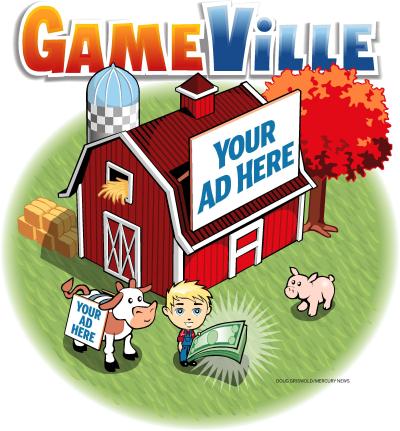圣何塞水星报:与社交游戏结合推动广告营销的新模式
据圣何塞水星报消息:你身边是否就有这样的社交游戏玩家,他们经常在你的Facebook页面上更新游戏进度,如他们的“FarmVille”葡萄酒配方,或者“Mafia Wars”中抓住的宝石中间商。
如今,美国人大约1/3的上网时间都花在社交网站或者玩游戏上。广告商们也瞄准了这一热潮,纷纷想方设法宣传自己的品牌。这并不是希望社交游戏广告取代谷歌的关键词广告搜索或者雅虎的横幅广告,而是通过社交网络和游戏为广告商提供一种新的发展机会。
SupersonicAds的运营主管Arik Czerniak说:“我认为这是一种十分新颖的广告产品。”人们只需观看该公司的广告或做出某些回复,便能获得Facebook或His社交游戏的虚拟货币。比如,玩家想要获得Playdom公司“Social City”的游戏币“city bucks”的话,他只需观看Adam West,Erik Estrada的一个长达4分23秒的 Butterfinger广告,便可以获得1“city buck”,或者注册一个新的Netfix账号,游戏用户也可以获得113“city bucks”。
如此一来,每次顾客点击这些广告,Butterfinger和Netfit就需支付一笔广告费。这笔广告费则分别由SupersonicAds和使用该虚拟货币的游戏开发公司获得。
SupersonicAds认为比起网络上传统的陈列广告,他们这种广告方式更能帮助品牌吸引顾客。泽涅克Czerniak指出一个例子,德国运动鞋公司阿迪达斯设计了这么一个链接。人们点击后可以进入页面,花费几分钟“设计”一双新款运动鞋,便可以获得虚拟货币。如果用户愿意在Facebook上与朋友们分享自己的“设计”的话,他便可以获得更多的虚拟货币。
“这并不会令你觉得烦躁,也不会妨碍你的游戏兴致。”Czerniak说。他认为互动本身就是一种游戏,通过这种方式,还能塑造游戏玩家的品牌喜好,如玩家可能因为“可口可乐帮助我赚钱买FarmVille中的拖拉机”而喜欢上可口可乐。
在近期发表的一份Nielsen Online报告中我们可以发现:现在美国人花在Facebook等社交网络或玩游戏的时间比花在发送邮件来得长。游戏及社交时间的增长则给在线活动如谷歌搜索或雅虎门户网站带来了损失。
对于社交游戏的未来, SupersonicAds的“机会是巨大的”Michael Fauscette这么说道。它可能不会成为下一个google,但是会成为将来某一天google需要的模式,也可能是雅虎或者亚马逊需要的模式。这样的营销方式更多是建立在玩家的社交忠诚度上。
从某一方面来说,这种虚拟货币的策略有点类似于航空公司的“飞机里程”项目,蕴涵着玩家的“忠诚度”。但Fauscette则认为像设计阿迪达斯运动鞋这种活动会令人觉得“不像是广告”。
“你也许会怀疑这种网络宣传方式是否能达到你所要的销售效果,因为也许顾客们并不是真的喜欢你的商品,他们只是喜欢玩游戏。” Frank说,“如果你的朋友一直用一些你不感兴趣的事情骚扰你,你会怎么做?我很肯定自己将会郑重考虑与这类人减少来往。”
SupersonicAds的广告商列表中包括Cisco Systems, Air France, Nokia, T-Mobile, The New York Times 和 Nike等企业。这家总部在伦敦的公司在旧金山和特拉维夫也设有办公室。一开始, SupersonicAds的发展中心主要在欧洲。 Czerniak 当时认为欧洲市场仍处于“真空状态”,而如今该公司已经将重心转移至美国,并在近期的一轮融资中获得了200万美元。
Skype和eBay的前任执行官Michael van Swaaij是该轮融资的主要投资者,他认为该公司最引人之处在于广告商,顾客和游戏开发商都能从这种交易中获利。
“皆大欢喜,这是一种相当独特的广告营销方式。”van Swaaij说。“游戏领域是巨大的,我们正努力将其发展得更好。这是一种世界性的潮流,而并非仅仅是地区现象。游戏的发展比起其他网络形式更为迅速。”
You know the type — social game addicts who pepper your Facebook page with updates about the wine recipe they created playing “FarmVille,” or the gem broker they robbed on “Mafia Wars.” To fuel their gaming, those same people may soon be posting updates about the sneaker they designed for Adidas, or the app they downloaded for Coke.
With Americans now spending a third of their online time logged into social networks or playing games, advertisers are trying to harness that enthusiasm to get people to engage with their brands.
No one expects game-based social advertising to supplant Google’s huge AdWords search business or Yahoo’s lead in banner display ads, but the model is another example of how the explosive growth of social networking and gaming offers new opportunities for advertisers to target an online audience.
“We see it as an entirely new kind of advertising product,” said Arik Czerniak, chief operating officer of SupersonicAds, a company that allows people to earn the virtual currency needed to play games on social networks like Facebook or hi5 by watching video ads or responding to targeted offers.
For example, players who need “city bucks” to keep playing Playdom’s “Social City” game on Facebook can earn one city buck by watching a 4 minute, 23 second Butterfinger ad starring aging TV stars Adam West and Erik Estrada, or pull in 113 city bucks if they sign up for a new Netflix account.
The fee an advertiser like Butterfinger
or Netflix pays each time a consumer responds to an ad is split between SupersonicAds and the developer of the game where the virtual currency is used.
SupersonicAds says it can get social network users to engage more deeply with a brand than is possible with standard Internet display advertising. For example, Czerniak said a large brand such as the German sneaker company Adidas could offer game players a chance to earn virtual currency by clicking on a link that allows them to spend several minutes creating a “design” for a new kind of shoe. The user could earn even more virtual currency by sharing their Adidas design with their friends on Facebook.
“It isn’t something that annoys you and stops you from having fun,” said Czerniak, adding that the interaction itself is kind of a game, and may cause game players to feel affectionately toward a brand like Coke, because “Coca-Cola helped me buy the money for my ‘FarmVille’ tractor.”
A recent Nielsen Online report found that Americans now spend more time online on social networks like Facebook or playing games than they spend sending and reading e-mail. And the growth in gaming and social time comes at the cost of online activities like Google search and Internet portals like Yahoo.
Given the growth in social gaming, SupersonicAds’ “opportunity is huge,” said Michael Fauscette, who follows emerging trends in software for the research firm IDC. “It’s not the new next Google, but it could be something that Google buys down the road, or Yahoo buys, or Amazon buys — or Facebook buys. It’s one more component of building loyalty in a community and keeping people engaged in the community.”
In a sense, the virtual currency strategy includes elements of “loyalty” programs like airline frequent-flier programs, but Fauscette said the creative engagement of promotions like the adidas shoe design could make people feel “it’s not really advertising “… I think it’s different from, ‘I’m hawking merchandise that I don’t have any investment in.’ ”
On the other hand, given that the rules of engagement in social networks are anything but settled, it’s also a strategy that could backfire if people suddenly feel overwhelmed with brand promotions from online “friends” they hardly know in real life, said Andrew Frank, an analyst with Gartner.
“You wonder whether this kind of behavior crosses the line from friendly promotion to where you are manufacturing interest, because people aren’t really interested in your product. They are interested in playing the games,” Frank said. “How annoying is it if my friends start spamming me with brand promotions I’m not interested in? I would certainly consider unfriending people for that kind of behavior.”
SupersonicAds’ list of advertisers includes Cisco Systems, Air France, Nokia, T-Mobile, The New York Times and Nike. Based in London, the company also has offices in San Francisco and Tel Aviv.
SupersonicAds initially focused on Europe, where Czerniak said there was “a huge vacuum,” but is now focusing more on the United States, and recently received a $2 million round of funding.
Michael van Swaaij, a former executive with Skype and eBay who was a lead investor in that round, said one thing that attracted him about the company was that the advertiser, the consumer and the game developer all get something out of the transaction.
“Everybody is happy, and that’s relatively unique in advertising,” van Swaaij said. “Games are huge, and we are making them better. And it’s worldwide; it’s not a local phenomenon. This is growing much faster than the rest of the Web.”(source:mercury news)








































 闽公网安备35020302001549号
闽公网安备35020302001549号